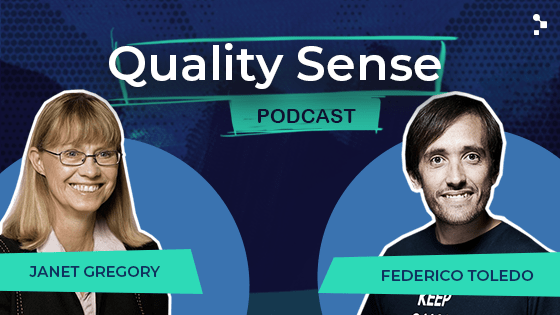Victor is 31 years old, lives near Cerrito de la Victoria in Montevideo, Uruguay, and is convinced that testing can help improve health access.
Victor Scotto’s story is a clear example of how work can help people gain autonomy and empowerment, to improve their quality of life in a meaningful way.
Victor, a passionate tester, suffers from a chronic bleeding disorder that can become disabling if inadequately treated. Unfortunately, this has been his case. But he has managed to pull through, and now seeks to help as many people as possible along the way.
The disorder is known as hemophilia, and its main characteristic is that the blood does not clot properly. According to the U.S. Centers for Disease Control and Prevention CDC, hemophilia can lead to serious long-term problems such as chronic joint disease and pain in the case of bleeding into joints. In addition, seizures and paralysis if there are hemorrhages in the head and brain, and even death.
According to the CDC, hemophilia affects 1 in 5,000 male infants, across all racial and ethnic groups.
“When I was a baby, I was bruised, cried a lot in pain, and crunched when I was grabbed even if it was mildly. At first, they thought it was symptoms of abuse. But they did tests and diagnosed me right away when I was only 6 months old,” said Victor.
“Hemophilia is characterized by spontaneous bleeding. One day you can go to bed normally, and the next day you wake up with a joint full of blood, a lot of pain and inflammation, and the need to go to the doctor to receive the necessary medication to make your blood clot properly,” he explained.
Until almost 3 years ago, every time he bled, he had to undergo treatment and rest for 3 or 4 days. As a child, he lived “in a bubble” due to the fear of his family and his environment in general.
“This situation resulted in me being absent a lot, and I fell behind. First as a student and then as an adult at work. All this led me to be a person without any autonomy. The bleeding affected my articular cartilage. I had to deal with pain and physical instability because they said I was too young to have a prosthesis. It got to a point where it was hard for me to walk. I felt a lot of frustration for not being able to change my situation. Many times I had to quit my studies or work because of related problems.”
Victor explained that it is possible to receive treatment on demand or as prophylaxis. “I received treatment on demand from the age of 8 until I was 29 years old, which means that I had access to medication when the bleeding had already started. Prophylaxis consists of receiving mediation regularly in order to have high levels of coagulation and prevent bleeding. Nowadays it is suggested to start porphylaxis in your first years of life in order to avoid these bleedings, to lead a normal life with less limits and to avoid irreversible physical damages.”
Far from falling down on this path, Victor has managed to pick himself up and move forward. Starting the prophylaxis treatment radically changed his daily life. He was able to take control of his life, although he still has major sequelae and disability in his left knee. He was able to start “projecting a life with more aspirations”. On this path, his access to the world of software testing and job reconversion was fundamental.
Health IT, software testing and science
Fortunately, the progress of science is very encouraging and today there are treatments for hemophilia that have changed history forever. In addition, thanks to Health IT, there are numerous applications that facilitate the daily lives of those affected.
The terminology Health IT refers to the use of hardware, software and IT infrastructure to provide more and better tools for the healthcare system and people’s health.
According to a Roche publication, “children diagnosed with hemophilia have a normal life expectancy, where a century ago life expectancy was a mere 11 years.”
“My intention is to make this situation visible and I think I link this very much to my experience in software testing. Since finding these flaws in the system in which we live and contributing with others to solve them can help to prevent them from repeating in an endless cycle,” Victor outlined.
Health IT is expanding every day, and software testing is concerned with finding bugs in systems of all complexities. As a result, testing can literally be vital to the healthcare system and people’s health.
Over time, Victor has managed to extrapolate all his knowledge in software testing to life itself and to his personal situation. And today he dreams of using testing as a tool to help improve people’s access to healthcare.
Currently, in addition to having a paid job as a tester, he is a volunteer at the Douglas Piquinela Foundation, which seeks a comprehensive approach to hemophilia to improve its diagnosis and treatment. Thanks to his knowledge in testing, in addition to his work as a member of the board, he has been able to help with exploratory testing on the foundation’s website.
From there, Victor wants to prevent this disorder from becoming disabling in people’s lives, as it happened to him.
– How did software testing help you on your way?
None of what I do today would have been possible if I had not started on the testing path and made a job retraining. There I learned to have a different perspective on my own life, gain autonomy, and apply all the knowledge I learned in testing to my life in general.
– How do you apply them?
I believe that as a person I had the opportunity to test the health system with my experiences. The failures I found served as a testimony so that other generations do not have the same thing happen to them. Making my situation known is a way of reporting this, just as it is done in testing for each error found. The treatments already exist, medicine is advancing, it is difficult to access them, but it is very important to know that they exist. In order not to repeat the same errors in a loop, but to highlight them so that they can be solved.
– How does Health IT help in this respect?
Today there are medical IT systems and numerous applications that help patients keep track of how to administer their medication or access it more quickly. By collecting data, you can see how to make treatments more effective and work on prevention. This contributes to improving people’s quality of life.
A long journey
Before becoming a tester, he worked as an administrative assistant and PC repairman. In search of a better future, he took a testing course offered by Abstracta at Enlace Cowork.
He signed up through the National Institute of Employment and Vocational Training of Uruguay in conjunction with the company now called NexosUy, which contains an online portal of job offers for people with disabilities.
In the course, he learned about manual testing, exploratory testing, the life cycle of software products, the creation and execution of test cases and the elaboration of incident reports. In addition, the importance of being detail-oriented and working collaboratively as a team to achieve quality software.
He understood how his work can gain relevance in the software product cycle, as part of a much larger gear.
“It was a mix of many factors that brought me here. My goals were to be able to work in the world of technology which, as we all know, has always been very promising. But most of all to grow, to have autonomy and to feel that I can contribute to relevant issues in people’s lives.”
After completing the course, he had the chance to do a 7-month internship at Abstracta, and there he started a professional path that would be very significant for his life.
After his internship, he worked as a tester at NexosUy. Then, with more self-confidence, Victor continued studying. First advertising, and recently he started Communication, in order to have more and more tools. He is currently working as a software tester intern at the National Resources Fund of Uruguay, and is a volunteer at the Douglas Piquinela Foundation.
– How did the internship at Abstracta change your path?
I found myself in a world I didn’t know, made up of many projects for many people from different countries, with different expectations and needs. It was a very enriching experience. I felt warmth, empathy and self-improvement, as well as commitment to reach a common goal. That motivated me a lot.
– What was your journey like once you joined?
The first weeks training I learned a lot of things before starting to participate in any project. I was just starting in testing. The first project I had the opportunity to participate in was linked to “The RealReal”, an online marketplace for luxury goods. It was my first approach to English as a tester. Then came Iruka, an app that accompanies families, especially those who need support from various professionals in the development of their children. I liked this because I felt that I could contribute to projects that help people from a more human point of view.
– How has your job conversion impacted your life?
In many ways, but the fact that it was through Abstracta made all the difference. It opened many doors for me. When people know that you worked at Abstracta, they associate it with the fact that you had a good education and that you aim for quality, since that is the way they work there. For me it was very important because I saw that I could work on something different, relevant and of quality. All this breaks your own limits, it shows you another world. I was able to glimpse new horizons.
– What do you mean?
I understood that there are people who are interested in including those who for various reasons in life sometimes see that their path becomes uphill, like me. I understood that the IT world and testing can be a crucial part of that path, and I want to be part of it.
– What are your future projects?
I plan to continue volunteering at the Douglas Piquinela Foundation. The idea is to raise awareness about the importance of treatment improvement. I also plan to continue deepening in testing, I want to acquire knowledge in BD, automation, polish my skills as a manual tester, study English and keep advancing every day. I intend to become part of projects that have to do with health, wellness and innovation, which give possible solutions to deep problems of our lives. I would like to have the opportunity to do testing on websites or applications that help in the lives of people with hemophilia and other pathologies, as well as in health in general. The world is constantly moving forward and if we are prepared for those changes, everything will happen. I try to be in constant movement, aware of the achievements and eager for more.
Follow us on Linkedin, Facebook, Twitter, and Instagram to be part of our community!
Tags In
Related Posts
TestingUY 2017 with Michael Bolton, a Week of Pure Testing
A recap of the week of the fourth edition of TestingUY If I could describe last week in one word, it would be intense. With TestingUY on Monday and Tuesday, the Rapid Software Testing course Wednesday through Friday by our keynote speaker, Michael Bolton (internationally…
Quality Sense Podcast: Janet Gregory – Facilitating Agile Teams and Trainings Remotely
Experiences in rapidly adapting in-person trainings to a remote setting, tips for working from home, and more with Janet What to Expect? In this episode of the Quality Sense podcast, host, Federico Toledo, interviews Janet Gregory, co-author of three highly influential books: “Agile Testing: A…








